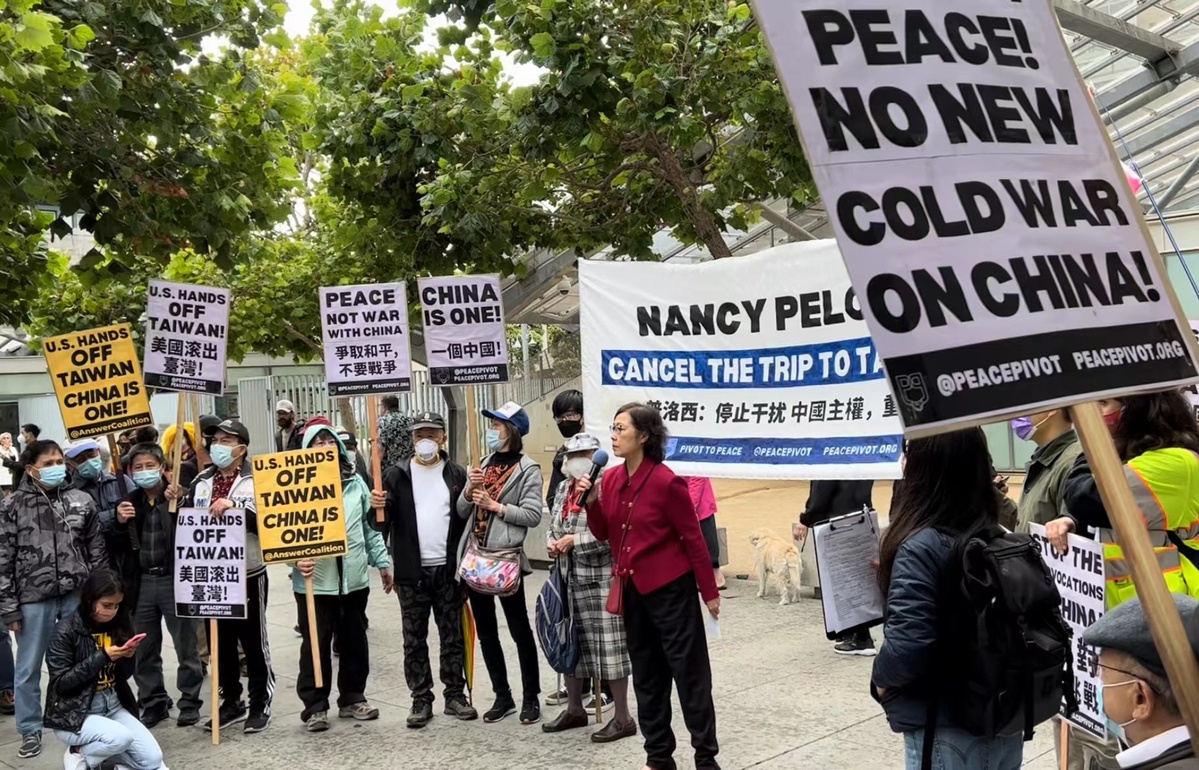
Activists from Pivot to Peace, ANSWER Coalition, CODEPINK, Veterans for Peace and leaders of the Chinese community in San Francisco hold a demonstration in front of US House Speaker Nancy Pelosi's office at the San Francisco Federal Building on Monday. [Photo by Lia Zhu/China Daily]
By Jason Lee
The leaders of the world's two biggest powers had a candid conversation via video link on Thursday, with President Xi Jinping focusing on the Taiwan question and telling the US side to not interfere in China's internal affairs.
On the other side, in a short White House news release, US President Joe Biden said Washington's one-China policy "has not changed" but obscured the situation by asserting he opposes "unilateral efforts" to change the status quo across the Taiwan Straits.
The talk between the two leaders took place before a delegation led by Speaker of the House of Representatives Nancy Pelosi, the third-highest-ranked US leader, began a tour of Asia, with a stop in Taiwan. By not clearly denying the reports of her planned visit to the island and giving ambiguous answers to the vital question, Pelosi is trying China's patience.
Although Biden said "unilateral efforts" should not be made to change the status across the Straits, the international community is seeing which country is trying to do that. Without issuing a statement, asserting the importance of the "one-China" principle to Sino-US relations and peace and stability across the Straits, the Biden administration has put the most important bilateral relationship at stake.
Biden knows that an open conflict with China is not an option at this point, especially when the United States is indirectly, but deeply, involved in the Russia-Ukraine conflict. But he dare not say so because of political compulsions.
Politics is meant to improve governance and solve people's problems. But politicians have turned it into a "distraction game", in which they first identify a state as an enemy, tell the people that their country is under threat and attribute all the problems to the enemy state. They go on repeating the same thing over and over again until the people come to believe it and blindly follow the politicians and vote en masse for them in the belief that they will save the country. This builds a closed-loop system, which some politicians use to stay in power. Needless to say such politicians' focus is always on winning the next election, not on addressing real issues. And Biden is no exception.
What are the real problems the United States faces? A slowing economy, rising inflation, growing racial inequality and increasing gun violence to name just a few.
To reduce inflation, the administration needs a comprehensive plan and proper implementation. To eliminate racial inequality, the government needs to thoroughly reform the social welfare system, which in turn would require fundamental changes and take a long time to yield results. Gun control, however, appears impossible, given the US' constitutional and social structure.
As such, Biden and other Democratic Party leaders have chosen the easy but irresponsible way to garner Americans' votes: divert their attention from their hardships and pain. Perhaps the US president believes that, thanks to the genius strategy, he has a better chance of winning back people's votes in the midterm elections in November.
Yet the administration cannot solve any of its problems by playing the Taiwan card. Instead, it will worsen the situation in the Asia-Pacific region and further deteriorate China-US relations. Also, the US will end up paying a price for using such tactics. Fed with hatred and fear-mongering, US voters may tend to elect even more radical congress members. As a result, lawmakers will have to make even more radical moves to comply with the toxic social atmosphere.
For example, after reports of Pelosi's visit to Taiwan started doing the rounds, lawmakers on both sides of Washington's political divide urged her to go ahead with the visit. Now, after all the drama, if she doesn't visit the island, she could be labeled a coward, not qualified to hold the position of House speaker. But if she goes, she will pull the trigger on the world's most important bilateral relations. And a veteran politician like her knows about the consequences.
Similarly, if Biden intervenes, he will be portrayed as a "man without guts". And if he doesn't, he may drag Taiwan and the international community into an abyss of no return. What else can Biden do?
He is a leader who doesn't dare to face the US' real problems. And Pelosi is the same.
Days ago, San Francisco declared a legal state of emergency to deal with the growing number of monkeypox cases. But Pelosi, who was elected from the city, doesn't seem to care about the emergency medical situation. Or else, she wouldn't have flown to the other side of the world to provoke tensions-she was in Singapore, the first stop on her Asia tour, on Monday.
History tells us that all great powers have collapsed from within. The US will continue to prosper only if it can solve its problems, not by provoking other countries. By diverting American citizens' attention to Taiwan, the administration cannot address any of the US' problems.
Therefore, Biden should stop playing games and do what he promised to do for the betterment of the people, because as US president, he is supposed to work for the interest of the American people.
And people around the world, including his supporters at home, would like to see Biden stop interfering in the Taiwan question, because they all cherish peace and stability. In other words, the US should not test China's determination to safeguard its sovereignty and territorial integrity, and achieve national reunification.
The author is a member of the Guangdong Province Zhongshan City Committee of the Chinese People's Political Consultative Conference, executive vice-chairman of the Hong Kong CPPCC Youth Association, and vice-chairman of the Hong Kong Y. Elites Association.

 中文
中文



